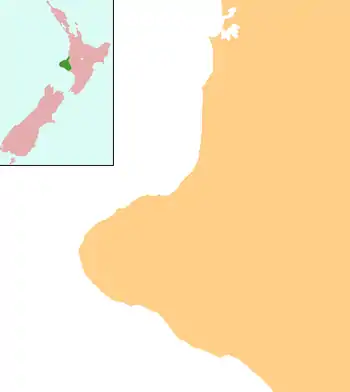Tongapōrutu
Tongapōrutu is a settlement in northern Taranaki, in the North Island of New Zealand. It is located on State Highway 3 at the mouth of the Tongaporutu River, 15 kilometres south of Mokau. Tongapōrutu is well known in New Zealand for its 'Three Sisters' rock formations and its Māori petroglyphs carved into cave rock walls. However, both the Māori rock carvings and the 'Three Sisters formations are constantly being eroded by the Tasman Sea.
Tongapōrutu | |
|---|---|
 Tongapōrutu | |
| Coordinates: 38°49′12″S 174°35′53″E | |
| Country | New Zealand |
| Region | Taranaki |
| District | New Plymouth District |
Further reading
General historical works
- History of the Te Horo Tunnel and the Main Road North from New Plymouth to Mokau, New Plymouth, [N.Z.]: Te Horo Restoration Society, 1999
- Tongaporutu, Ahititi, Okau: centennial booklet 1897-1997, New Plymouth, [N.Z.]: n.p., 1997
- Gray, Brian E. (2000), The Tongaporutu River Valley: a history of the combined districts of Tongaporutu, Ahititi, Okau, Kotare, Rerekapa, Inglewood, [N.Z.]: Tongaporutu Historical Committee
Business history
- de Jardine, Margaret (1992), The little ports of Taranaki: being Awakino, Mokau, Tongaporutu, Urenui, Waitara, Opunake, Patea, together with some historical background to each, New Plymouth, [N.Z.]: M. de Jardine, ISBN 0-473-01455-6
- "Puke Ariki". Archived from the original on 20 June 2008. in New Plymouth contains the letter book of the Waitara-based shipping agent, Lewis Clare (died 1960). This book records coastal shipping from and into small North Taranaki ports (including those mentioned in de Jardine's book) between 1910 and 1920. See "Clare, Lewis (ARC2002-255)". Retrieved 12 December 2011.
Anglican
- Parochial District of Saint Peter-by-the-Sea, Mokau: "come unto me"., Mokau, [N.Z.]: Parochial District of Saint Peter-by-the-Sea, 1956
Geology
- Grange, L.I.; et al. (1927), The geology of the Tongaporutu-Ohura Subdivision, Taranaki Division [Bulletin (New Zealand Geological Survey Branch); new ser. no. 31], Wellington, [N.Z.]: Geological Survey Branch, New Zealand Department of Scientific and Industrial Research
- Harris, G.E.; et al. (1926), Geological map of Aria survey district, Wellington, [N.Z.]: The Survey Scale: 1: 63 360 (i.e. 1 in. to the mile)
- Harris, G.E.; et al. (1926), Geological map of Mimi survey district, Wellington, [N.Z.]: The Survey Scale: 1: 63 360 (i.e. 1 in. to the mile)
- Harris, G.E.; et al. (1926), Geological map of Ohura survey district, Wellington, [N.Z.]: The Survey Scale: 1: 63 360 (i.e. 1 in. to the mile)
- Harris, G.E.; et al. (1926), Geological map of Pouatu survey district, Wellington, [N.Z.]: The Survey Scale: 1: 63 360 (i.e. 1 in. to the mile)
- Harris, G.E.; et al. (1926), Geological map of Waro survey district, Wellington, [N.Z.]: The Survey Scale: 1: 63 360 (i.e. 1 in. to the mile)
- Mills, Carey R. (1988), Gravity expression of the Patea-Tongaporutu High, eastern Taranaki, North Island, New Zealand (M.Sc., Victoria University of Wellington)
Maori
- Phillips, F.L. (1989–1995), Landmarks of Tainui = Nga tohu a Tainui: a geographical record of Tainui traditional history, Otorohanga, [N.Z.]: Tohu Publishers, ISBN 0-908596-26-X
- Phillips, F.L. (1995), Landmarks of Tainui = Nga tohu a Tainui: a geographical record of Tainui traditional history, volume two, Otorohanga, [N.Z.]: Tohu Publishers, ISBN 0-908596-32-4
Maps
- Haylock, A.L. (1895), Tongaporutu improved farms settlement: Mimi survey district, Wellington, [N.Z.]: New Zealand Department of Lands & Survey Scale: 1: 39 600 (i.e. 1/1.6 in. to the mile)
- Skeet, H.M. (1896), Village of Tongaporutu, Mimi Survey District, Wellington, [N.Z.]: New Zealand Department of Lands & Survey Scale: 1: 3 168 (i.e. 1/20 in. to the mile)
- New Zealand Department of Lands & Survey (1986), Tongaporutu, Wellington, [N.Z.]: New Zealand Department of Lands & Survey Scale: 1: 50 000 (i.e. 1/1.27 in. to the mile) NZMS 260 ; v Q18
People
- Genealogical information, a family Bible, and sketches of the Mohakatino and Tongaporutu Rivers are contained within the Messenger family collection held within "Puke Ariki". in New Plymouth. William Messenger, his wife, Mary, and their adult children initially settled at Omata upon arriving in New Zealand in 1853. See "Messenger family". ARC2002-357.
- Pat Greenfield Taranaki Daily News profile
This article is issued from Wikipedia. The text is licensed under Creative Commons - Attribution - Sharealike. Additional terms may apply for the media files.